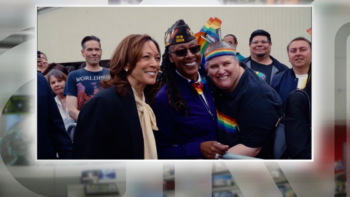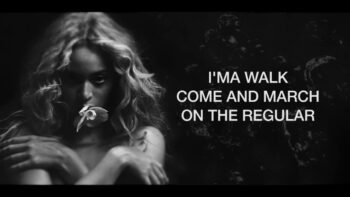By Gary Symons
TLL Editor in Chief
Beyoncé has blocked Donald Trump from using her song “Freedom,” after the song was used for a Trump campaign video on social media.
The singer-songwriter previously agreed to the use of “Freedom” for the opposing Kamala Harris campaign, where it has become essentially the theme song for the Democratic Party for the 2024 presidential race. It is featured in a new a cappella version of the song in a lengthy campaign ad from the Harris campaign, overlaying a voiceover from the Oscar-nominated actor Jeffrey Wright.
Harris has also used the song at other campaigning events, and her supporters have been pictured wearing cowboy hats and “Cowboy Kamala” sashes, referencing Beyoncé’s 2024 album Cowboy Carter.
However, Trump campaign spokesman Steven Cheung posted a video of Trump walking off a plane while the song “Freedom” plays in the background.

That prompted Beyoncé’s record label and publisher to threaten a cease and desist order, and Cheung subsequently deleted the video from social media. Beyoncé is represented by her own label Parkland, Columbia Records, and parent company Sony Music.
Trump has a long history of using artist’s music without their permission.
Most recently, the estate of music legend Isaac Hayes announced it plans to sue the Donald Trump campaign for unauthorized use of the song “Hold On, I’m Coming.”
The family threatened the $3 million lawsuit, saying the presidential nominee for the GOP and his lawyers have ignored previous requests to halt the use of the song at political rallies.
Isaac Hayes III, the son of the Grammy-award-winning artist said the song has been used 135 times over the past several years without Trump’s team ever asking permission or paying to license the soul classic.
The singer-songwriter Eddy Grand sued Trump’s campaign for its use of his song “Electric Avenue,” and many other musicians have issued public takedown notices. Adele, Earth Wind and Fire, Tom Petty’s estate, and John Fogerty have all issued statements demanding the campaign stop using their music without permission or payment. Most recently, the Canadian superstar Celine Dion, who wowed crowds and viewers during the Olympics, took to social media to disavow the use of her song ‘My Heart Will Go On’ at a recent Trump rally.
Most artists stop short of launching legal action due to the cost and complexity of these cases. Grant’s case, for example, has been ongoing for three years.
Neil Young, for example, filed a lawsuit in 2020 after first writing an open letter to Trump that read in part: “Every time … one of my songs is played at one of your rallies, I hope you hear my voice. Remember it is the voice of a tax-paying US citizen who does not support you. Me.”
Young’s lawsuit included a statement saying the singer “cannot allow his music to be used as a ‘theme song’ for a divisive, un-American campaign of ignorance and hate.” Young later voluntarily dismissed the case.
Beyonce and Sony Music, however, are both powerful players in the music industry with the money and influence to take on a lengthy and expensive lawsuit, that could also be damaging to Trump’s campaign due to the singer’s massive fan base in the United States. For now, it appears Trump’s campaign is agreeing to honor the artist’s copyright.
Isaac Hayes Estate Suing Trump For Unauthorized Use of Hit Song
